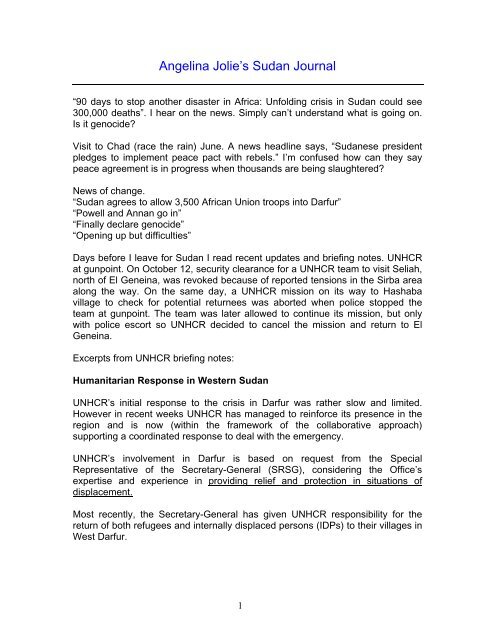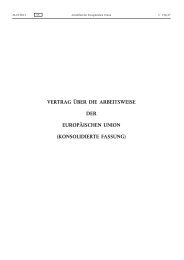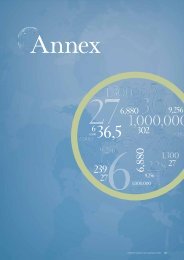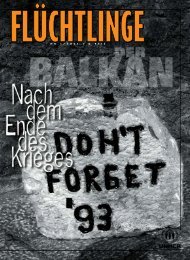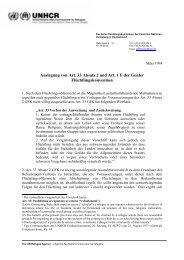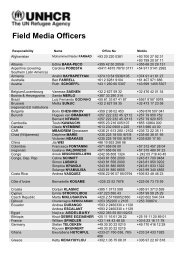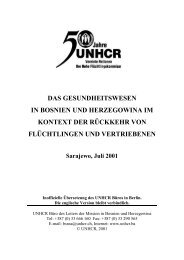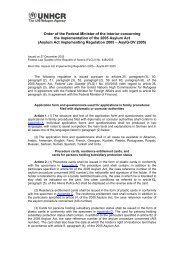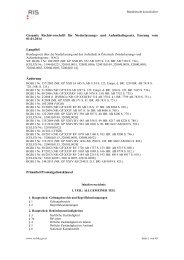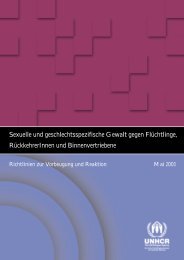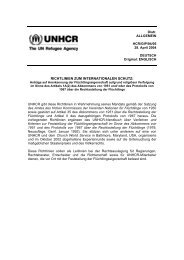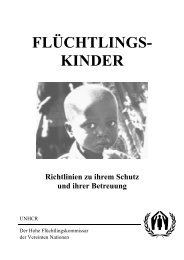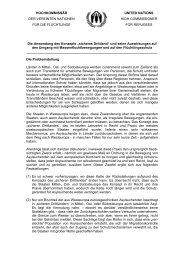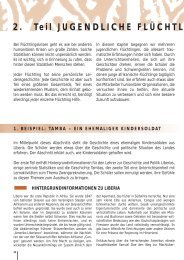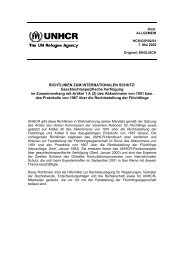Angelina Jolie's Sudan Journal - UNHCR
Angelina Jolie's Sudan Journal - UNHCR
Angelina Jolie's Sudan Journal - UNHCR
You also want an ePaper? Increase the reach of your titles
YUMPU automatically turns print PDFs into web optimized ePapers that Google loves.
<strong>Angelina</strong> Jolie’s <strong>Sudan</strong> <strong>Journal</strong>“90 days to stop another disaster in Africa: Unfolding crisis in <strong>Sudan</strong> could see300,000 deaths”. I hear on the news. Simply can’t understand what is going on.Is it genocide?Visit to Chad (race the rain) June. A news headline says, “<strong>Sudan</strong>ese presidentpledges to implement peace pact with rebels.” I’m confused how can they saypeace agreement is in progress when thousands are being slaughtered?News of change.“<strong>Sudan</strong> agrees to allow 3,500 African Union troops into Darfur”“Powell and Annan go in”“Finally declare genocide”“Opening up but difficulties”Days before I leave for <strong>Sudan</strong> I read recent updates and briefing notes. <strong>UNHCR</strong>at gunpoint. On October 12, security clearance for a <strong>UNHCR</strong> team to visit Seliah,north of El Geneina, was revoked because of reported tensions in the Sirba areaalong the way. On the same day, a <strong>UNHCR</strong> mission on its way to Hashabavillage to check for potential returnees was aborted when police stopped theteam at gunpoint. The team was later allowed to continue its mission, but onlywith police escort so <strong>UNHCR</strong> decided to cancel the mission and return to ElGeneina.Excerpts from <strong>UNHCR</strong> briefing notes:Humanitarian Response in Western <strong>Sudan</strong><strong>UNHCR</strong>’s initial response to the crisis in Darfur was rather slow and limited.However in recent weeks <strong>UNHCR</strong> has managed to reinforce its presence in theregion and is now (within the framework of the collaborative approach)supporting a coordinated response to deal with the emergency.<strong>UNHCR</strong>’s involvement in Darfur is based on request from the SpecialRepresentative of the Secretary-General (SRSG), considering the Office’sexpertise and experience in providing relief and protection in situations ofdisplacement.Most recently, the Secretary-General has given <strong>UNHCR</strong> responsibility for thereturn of both refugees and internally displaced persons (IDPs) to their villages inWest Darfur.1
<strong>UNHCR</strong>’s Three Pronged Approach<strong>UNHCR</strong>’s operation in western <strong>Sudan</strong> focuses on three main activities:1. Provide protection and assistance to the large IDP population in Darfur toprevent further displacement, including movements across the border;2. Create conditions conducive to the return of IDPs and some 200,000<strong>Sudan</strong>ese refugees currently in Chad, including monitoring for theprotection and security situations in areas of origin;3. Facilitate the voluntary repatriation in an organized fashion of some 3,600Chadian refugees of non-Arab origin to their country of origin in safety anddignity.<strong>UNHCR</strong> is assisting IDPs and refugees by providing psycho-social support toaddress the consequences of sexual violence. In the settlements, <strong>UNHCR</strong>encourages the establishment of women’s centers implemented through NGOs.Humanitarian AidCurrently <strong>UNHCR</strong> is airlifting urgently needed relief items such as 20,000 plasticsheets and 40,000 blankets from our stocks in Amman to the IDPs in Darfur.<strong>UNHCR</strong> is also helping with the distribution of non-food items in the camps.More than a million people have been displaced by 18 months of violence. Theofficial UN figure is 1.6 million IDPs and 200,000 refugees in Chad.THE UN HAS CALLED DARFUR THE WORLD’S WORST HUMANITARIANCRISISMarie-Noelle and I fly from England to Cairo and Cairo to Khartoum. We meetJavier and Jake and drive to <strong>UNHCR</strong> office for briefing. Handed walkie-talkies. Iam Golf Romeo 9-1.They talk about being careful driving on the roads. There was recently anexplosion of an anti-tank mine killing two Save the Children staff. It was onOctober 10, when Masteri (south of El Geneina) was declared a "no go" zoneafter an alleged rebel attack on a police station.One and a half hours later. We drive back to the airport. On the tarmac manytypes of WFP planes for food drops. The sun is just rising. It looks like a vision ofhope.We are all hitching a ride on a WFP plane. It’s late to arrive. I don’t care, they arebusy I’m sure, doing important things. WFP fed more than 1.3 million people in2
the Darfur region of western <strong>Sudan</strong> in September, exceeding its own target of 1.2million and recording its largest food distribution since the humanitarian crisisbegan. Using a combination of trucks, aircraft and trains, WFP moved a total of21,535 metric tons of food aid to 1,336,992 people in crisis-affected areas ofNorth, South and West Darfur.The 3 members of WFP we’re flying with are very kind and welcoming. I oftenworry I might get in the way, but they did not make me feel that.We fly into El Geneina, Darfur.“Hold on there is no runway.” Solid landing. Along the side of the dirt strip are oldcrushed planes that groups of animals are using for shade.Off the plane we are met by the UN security officer. He asks to speak with meprivately and walks me away from the others. “You will be in a very remote area.If there is an emergency you are 5 hours by road. Do you have any medicalinformation, medication or condition that we should be aware of?” Fortunately Idon’t. I tell him “no.” He warns, “Don’t wander off for walks on your own. Usecommon sense for your own personal safety. We understand you wanted to bewithout a security escort so be careful.” I thank him. He then boards the plane wejust got off.I meet Francis with <strong>UNHCR</strong>. He is a Malaysian man based in Ankara, Turkey.There is something about him that makes me know immediately that we will befriends.I notice immediately the intense dry heat. I look around. There are mud housesand goats. Anytime a <strong>UNHCR</strong> car passes children they smile and wave andsome run alongside.Out the window I see, like in most parts of Africa, a poor but proud, handsomepeople walk along the dusty roads. Driving through the town, not the camp, Ithink to myself these are the people this is the way of life that is under attack. Wepass an ICRC house and WFP cars then stop at a cement house with 3-foot-highcircles of barbed wire along the top. This is the <strong>UNHCR</strong> compound.3
<strong>UNHCR</strong>/ K. Mckinsey/ 08.2004<strong>UNHCR</strong>/ H. Caux/ 12.2004“So we have an electricity problem for most of the day. At 8:30 curfews begin andelectricity goes off. You will hear only the sound of praying in the mosques. It’sbeautiful.” We learn about solar power uses in <strong>Sudan</strong>. The UNDP project aims atmeeting suppressed and growing demand for electric energy in semi-urban<strong>Sudan</strong> through reliable photovoltaic domestic systems to substitute fossil-basedgenerating units.Kids smile and say, “HAWADJIA, HAWADJIA.” They always call us that. Itmeans white person.I am told, “Remember the word TAMAN means ‘wonderful’ or ‘cheers.’ Say it tothe children. They will be happy to hear it.”4
The biggest problem here is moving around “go” areas and “no go” areas. AlsoUN workers have to wait for UN security to clear an area before others go. Manypeople and areas asking for clearance.I overhear the news. Israel air strikes kill 12 Palestinians. Instability inAfghanistan, war in Iraq -- fighting everywhere. Earthquake in Japan.The staff is very much in need of computer equipment. It’s apparently stuck in thepipeline. It is hard to imagine all the logistical problems there are working in thisarea.At the <strong>UNHCR</strong> office, the UN security officer gives us all a security briefing. Dueto the volatile situation in the region, the staff is advised to adhere to the securityinstructions in place and keep themselves abreast of the situation all the time.This is very important.Darfur is divided into localities:- 36 different main tribes- 98 with sub divisionsThey say the crisis started when there was a drought in the north and Arab tribesmoved south. But it was last February when it exploded. JANJAWEED. Securityis trying to work in the “no go” areas to try and open them up and access thepeople in need. There was a ceasefire in April 2004. There have been severalbreaches in August and security zones were created.October 10 Masteri armed clashes. Janjaweed attacked. Masteri was the onlymain road so it stalled operations for a while.Janjaweed allegedly attacked Abu Surug and Bir Seiba, north of the westernDarfur city of Geneina, on Oct. 16, leaving at least 11 people dead. Then itbecame tense in Geneina and difficult for aid workers to work with the localmilitary. Many people wounded by last attack were waiting outside of thehospital. They were unable to have access. “Simply too many wounded.”Zone wardens are at the guest house to alert of any changing zone warnings.DrivingI see women with bricks piled on their heads. 80% of construction you see isprobably done by women. Child labor is also a problem here. For the moment itseems that all aid relief is so needed. A very welcomed sign of hope. The peoplehere have been open to the increased group of internationals.5
He goes over evacuation plans. We are in a “rebel stronghold area”. Here, therebel forces are in control as opposed to the government. Security phase 3means only emergency.20 km outside El Geneina. Two vehicles minimum policy for security. Curfew.“You may hear shots tonight because it’s active.” No cell phones, and lines don’twork. Walkie-talkies, the only means of communication. Must have one. Whenyou get out of cars, drivers are instructed to wait facing a way out. If anythingstarts it escalates quickly. A man with a gun can stand in the road and call it acheckpoint and stop you. Don’t get out unless he asks you to.Bad roads.Lack of emergency government aid. Lack of UN designated doctors. Nohelicopter stationed here for medical evacuation. It takes a long time. Malaria andsunstroke are a problem. In reality, “this is an ongoing war.” “Have a good stay.Good luck. I will try to track where you are.”Ragnhild asks me upon leaving the office if I read the Human Rights Watchreport, “DARFUR IN FLAMES: Atrocities in Western <strong>Sudan</strong>”. “No.” “I’ll give it toyou. It’s very bad. Yes we know that but here is more. It’s very bad.”Driving.Barefoot dusty young men leading donkeys with plastic yellow faded water jugsand firewood.A low flying plane — white with WFP sign on it. Air food drops are resuming. Thefood was delayed so there was nothing to drop for a while. I imagine what seeingthat must mean to the people. To see it in the air again.We meet Maeve, an Irish woman with <strong>UNHCR</strong>. She has a warm smile and anobvious strength. We leave for the IDP camp section C. Some estimated 35,000people. IDP numbers keep growing. It is now up to 1.6 million. MEDAIR, MSF,Save the Children. NGOs including these are in the camp.There are many cases of SGBV (sexual and gender-based violence). But it ishard to get them to talk. When it comes to sensitive subjects like this one, aidworkers have to find the best way to approach it, respecting the beneficiaries’culture and traditions.I see a man being dragged into a station. An aggressive crowd follows. We driveon.________________________________________________________________6
Women are second class citizens. It is a result of the mix of culture and religionin the area. We pass an area where 90 African Union soldiers are based. Threethousand more are on their way for the whole Darfur area. That does not seemlike very many for an area the size of Texas. The 90 soldiers that are presentonly have four cars between them, so they are very limited.We arrive at the IDP centre. UNICEF water projects.We meet Barbara from Save the Children and Ream, a local woman who leadsus to a group of women doing their literacy class. Colorful head scarves. I thankthem for allowing the visit. I ask many questions but they are very shy. “We feelsafe inside the camp. But when we go out to get firewood we are not safe.” Theyare referring to the many cases of abuse and rape.<strong>UNHCR</strong>/ R. EkUNICEF and government schools, but there is no secondary school.Schools have been destroyed. UNICEF bringing in tents but still more areneeded.“What are you afraid of?” Certainly afraid of the Janjaweed. Beating and rape. Iask if their children are safe. “They need clothes, food, milk and sugar. We haveto stay here until it is safe. We wish we could go home. Even burnt down it ishome.”“Anyone still in the villages?” “No”, everyone says in chorus as if it is a crazyquestion. There is nothing. Dangerous. Some are here on their own. The7
Janjaweed targeted the men so many lost husbands. Those that are here want tofind jobs. “The problem with work or job skills is that we were farmers of animals.Here we have no animals. The ones that were stolen died on the way here, onthe road. No food. No water.”We try to get them to talk to share their experiences. They are passive but also Ithink they believe “inshallah.” (Arabic) “If God willing.”Some women took many days on foot to arrive here.Blue UN tarps cover the straw building as a roof. A heavy wind picks it up andshakes it around, making the babies cry. Still the women remain relatively quiet.Black flies.They have asked to receive sewing machines. Lack of funding won’t likely makethat possible. They would also like to learn how to make pasta. I find that funny. Iwonder if it’s from all the Italian NGOs in the area.They notice a picture of themselves on the cover of a UN briefing mission packet.They seem to like it and pass it around, pointing at each other, giggling.<strong>UNHCR</strong>/ R. Ek8
We speak with the men gathered under a tree. The sheikhs. Would they like touse the camera we bought and say something to the world? We stand waiting.Other men and children gather. They agree to talk. We ask to sit with them.They consider and then they make a gesture of yes. They speak of the securityproblem. “Even inside the camp?” I ask. “Yes sometimes they come and beatus.” This month is better. No sound of close fire. They fear if they go outside thecamp they will be killed. Ultimately they are prisoners of war.One man, old and as black as night with closed eyes and a white beard,occasionally nods in agreement. The men continue to speak of their fear of thefuture. As they speak, I find my eyes wandering onto the children. Flies walkingover their dusty faces, holes in their clothes. One is missing his two front teeth.Keeps smiling and giggling. After a while we say “Shukran” (thank you) and moveon.70-year-old woman. She has been here 11 months. “My eyes hurt, my eyeshurt.” Unfortunately the doctors don’t have extra funds and it is not anemergency.A woman introduces her small son and daughter. “Where is your husband?” Iask. “They killed him.” They burned their home and took all of their things.<strong>UNHCR</strong>/ R. EkI notice a small area with two small kids playing in the dirt. I ask, “How manypeople in those two rooms?” I would guess it was six feet by four feet. “Twelvepeople,” she answers. I stare at them. Unable to comprehend how that ispossible. There are 35,000 people registered but there are not 35,000 in the9
camp. So maybe the sheikhs are collecting and not distributing the rations. Butthat is an allegation I won’t make.The woman whose husband was killed also works as a cleaner in town. Shewalks two hours each way. She makes less than 200 dinars, which is less thanUS$1. The grandmother also walks, risking violence, outside the camp to collectfirewood.“We should go in groups or else they find us and beat us on the head.” Again thechildren gather. The girls giggle if I smile at them. The woman says, “I need morework to feed the orphans.” “Orphans?” I ask, confused. Then it is explained to meif a parent is killed they call the children orphans. “We are pleased to be here andsafe.”Along the dusty road, children are gathered together. What is happening, Iwonder. “Two chameleons are mating.” I suppose sex and animals are funny inany language.A little boy warns of big ants on the ground. All over. In fact, a few crawl up mypants. I feel one bite my knee and I squash it, then one on my backside. I can’tkill it without embarrassing myself. God it hurts. Eventually I embarrass myself.We say goodbye. They smile and wave.I take a 30 minute nap. Actually I passed out. Then Mimi brings me to the roof ofthe office to meet with Rick and Chris. They are here on an emergency mission.Francis joins us. “The refugee mandate is very clear. The legal process has to bethe Collaborative Approach to help IDPs. But IDPs are captive to politics.”<strong>UNHCR</strong> came in very late. Working with north and south and is very busy inChad. But with refugee-like situations for IDPs, the UN Secretary-General asked<strong>UNHCR</strong> to look after West Darfur.“There is a major gap for protection here. <strong>UNHCR</strong> is doing a lot but NGOs areway ahead. They are the eyes and ears of the international community now.<strong>UNHCR</strong> has to get access to areas of origin to see how to make it safe andstable to go back.”“<strong>UNHCR</strong> wants to work as part of UN to work with government and NGOs. Wedon’t want people displaced and living in IDP camps for 20 years. Buildingconfidence in a community. Ground level work. Get in the field.”10
“We are late but we’re here. Regularly going to the same villages. Following upon promises.” “Do you have the means for proper assistance?” I ask. “Yes wecould certainly start to take big steps forward, but it is the absence of propersecurity that is in our way.” It’s still going on. The government will say it’speaceful but if returned too early the people would become hostage to rebelgroups. We plan to start with one or two pilot projects and make sure they workwell.There are a lot of NGOs but there are still more needs than assistance (Clickhere for the list of NGOs.)Government says people are coming back from Chad. True? Or not true? If it istrue why not let the international community join and see that the people are trulyvolunteering to return and that they are given the help promised. Are theydropped in a safe place? (There have been rumors of women and childrendropped in dangerous areas.)Still many IDPs are out of reach of any aid relief.There was a report that 40% were not receiving aid. “How are they surviving?”Many are — somehow. We don’t yet understand these nomadic people, thesecultures. They are very resilient people, interesting people. Still, even thestrongest will only be able to survive so long. We have to look at their own tribalmechanisms to help resolve this conflict. That is something that <strong>UNHCR</strong> can do.Start talking to the village leaders, the tribal leaders.So many tribes and so much fighting. The word genocide is complicated. Leavethat to tribunals, courts and lawyers. What is certain is that there are thousandskilled, thousands raped and many being starved to death at this very moment.Ethnic cleansing? Yes. Grotesque human rights violations.Tonight is Ramadan. The local and international staff will eat together. They willbreak fast at 19:23. But 20:30 is curfew and they will have to leave before curfewto have time to get home. Dinner will be very short. Everyone is watching theclock.Yes there needs to be accountability for the violations. But it is not as simple orclear as Arab vs. Black, one good or bad. In the west we seem to want goodguys and bad guys. It is not that simple.As for the refugee population in Chad, the government can’t maintain over200,000 refugees for long. It has already drained the local population.Francis announces we have to stop the meeting. The local staff have arrived andthey will come up when you hear the prayer. It is time to break the fast. The11
prayer echoes throughout the town. On the roof with the moon out it is lovely,majestic.Dinner. Twenty-five of us are sitting around by candlelight talking about otherparts of the world. Iraq.“Radio checks.” Only time everyone laughs. “OK. Ten minutes.” Everyone fromthe “white house” has to head back. After they leave, as the night goes on, I canhear gunfire.I am told in the morning around 3:00 am, children will make noise, banging potsand pans. “Don’t let it scare you. They are waking everyone up for Ramadan. It’spart fun for them.” We think they are loudest at the <strong>UNHCR</strong> house. Gunshots andsinging in the mosque go on simultaneously. Then the guns stop. They don’tcontinue but the prayer does.Preparing to sleep, blowing out candles I realize I need batteries for my flashlight.Feeling silly, looking for batteries, Mimi and I realize that our flashlights sayWATERPROOF on their bright blue plastic. We laugh. The last place on earthyou would need anything water proof. Before bed, by my now-working flashlight Iread the Human Rights Watch report. “The Janjaweed militias are drawn fromArab nomadic groups. Their armed encroachment on African Zaghawa, Massalitand Fur pastures and livestock in past years resulted in local armed self-defensemeasures by the targeted communities when they realized the government wouldnot protect them….” I sleep under a mosquito net and wake up to the sounds ofwomen cooking outside. They are breaking firewood and speaking in a languageI don’t know.Over breakfast with Maeve, Viola, Swadee, Chris, Hélène, Rick, Francis andMarie-Noelle. We eat bread from last night. Bananas and condiments brought inby recent arrivals. Nescafe and sweetened condensed milk in a can (myfavorite). It must be because it reminds me of days in the field, like this, talkingwith <strong>UNHCR</strong> staff. This morning the conversation turns to the ICC (InternationalCriminal Court). Rick helps me to understand. The ICC is the first-everpermanent, treaty-based, international criminal court established to promote therule of law and ensure that the gravest international crimes do not gounpunished.Loud sound of a low plane. Another food drop.Late start. Not sure what’s happening. I think the basic computer system hascrashed. They are unable to communicate and there is talk of need for a carbattery. The helicopter has not landed. It lands. We drive off, only to get stuck in“cow traffic” (literally).12
At the helicopter we meet Nick, the flight coordinator. He is from Sydney. Lastbased in Iraq. He has helped to coordinate this part of the mission. “Just a quickbriefing,” he says. He explains where fire extinguishers and emergency first-aidkits are located and how to open the doors in the event of emergency. I admit Ilove helicopters so this is a bit of a treat. Unlike other choppers, it drives forwardbefore lift off.Three minutes into the flight, Nick points out a patch of dirt. “That’s where theother helicopter crashed. It was military and packed with weapons.FIREWORKS.”When we arrive we will be going to see the areas where homes have been burntdown and villages destroyed. It’s very systematically planned. It’s not just chaos.They attack very specific areas. They destroy and pollute the wells and attack themosques. In one area, for example, they destroyed the honey trees so if thepeople return, their livelihood is gone.As we fly over Darfur, the size of Africa overwhelms me. Just this small part of<strong>Sudan</strong> is the size of Texas or France. Most of our flight is without a glimpse ofpeople or villages. Over 20 minutes of just earth with a look and a feel thatbelongs only to this part of the world. Africa is a very special place. It has enoughresources to take care of itself 10 times over but somehow it has not been guidedto learn how to harness these resources. Outsiders continue to benefit from theinstability. I don’t have the answer but the problem does seem clear.We fly over HABILAH camp to makeshift homes that blend in with the dirt.Moments later we fly over destroyed villages. Abandoned. Nothing living. Darkcircles on the ground where homes have been torched.We land. The helicopter blades bringing up the dust and cloud. When the hazesettles I see about a hundred people lined up near a few scattered trees.We meet local staff based here in Magarsa. Adam, Marcus and Anders areScandinavian. Sonja is Egyptian. I am then introduced to Layla who is withINTERSOS, an Italian NGO.About 30 local men stand watching under a tree. There are hundreds of childrenlining up, curious about the new visitors. As soon as they see a helicopter theyrun towards it. Virtually no one has been here because it has been cut offlogistically. There used to be over 8,000 people here. Now there are 982. WFPis doing food drops. INTERSOS and <strong>UNHCR</strong> are here but only recently.INTERSOS first came 3 weeks ago and <strong>UNHCR</strong> 1 week ago. A lot of the worknow is trying to figure out what is left. Hospitals, schools, crops, etc. This is avillage of origin for some of the refugees in Chad.13
In the south, where fewer aid workers have been able to go, the situation isworse. Still daily rapes and raids. In that area alone, just last month over 100rapes were estimated.First, I will go to the two sheikhs of the village. It is explained I am here to learnwhat has happened.Their village was attacked and 48 people were killed. “Some could move, somecouldn’t. Many old people were too sick to move.” They went to the ‘Wadi’ (dryriver bed). They spent 6 months. They had been beaten. Their clothes andeverything had been taken. On the way to the lake 68 more people were killed.As they speak they stand straight and proud. Sad eyes. “We lost everything,”they repeat over and over. One man says, “My feet were tied, chilies were put onmy eyes and I was beaten. Six months eating grass and fruit. Eight people diedof starvation.”I feel these are peaceful men. Their movements, their way of speaking, even theway they tell their story. They tell it not with hate, just as fact. “Some were shotand burned and we only find their bodies now. There were a lot of rapes of ourwomen. We lost everything. What you see, what we wear now – all the women,all the kids – what they have on today is all we have. One woman is pregnanthere from the rape. Eight months pregnant.”Again children gather as we talk. If I look at them too long I’ll start crying. Theyhave witnessed so much. They have nothing, yet they sit quietly around theirelders and if you catch their eyes, they smile. Still generous of spirit. That justmakes it all the more heartbreaking.They lead us to the villages. The discussion on the walk turns to how some localpeople get threatened if they talk to internationals. As we walk through shrubsand green plants a few donkeys are grazing and birds are singing. The localchildren walk with us. A moment of peace. I can sense how these people couldlive peacefully as families. The nature of who they are is eye opening. I’m notmeeting IDPs or victims, but a people. Farmers. Families.They show me a pump built in 1995. “When the Janjaweed came they took themain pipe, now they are using it as a flag pole at their checkpoint. Rubbing it in.”Now it is unfit to drink, but it is all they have, so they do and it causes muchdiarrhea.The health centre is by the Janjaweed base. That makes it very difficult for localsto go and take their sick IDP children.14
The men tell me about 10 Janjaweed that were around but left when thehelicopter landed.The school was destroyed. No way to teach for the last two years. “Do you haveanyone to teach those that survived?” “No. We hope to find one – Inshallah.”They need clothes and medicine for diarrhea. They say the security in this area isvery bad. If anything starts they do not expect to be protected. They will fleeagain immediately. Why attack these people? Why here? They are apprehensivebecause the dry season is beginning.“We need land for the few cows we have left and most areas are taken over.”The men notice I have Arabic on my arm. Is that taken the wrong way here as itmight be in the States these days? No, it’s good.They show me a small twig house. I go in and I can’t imagine how eight peoplelive here. They can sleep outside but during the rainy season they sleep underthe plastic of used WFP bags from food drops. They show me an old cracked potfull of leaves. “We have no medicine so we use this for medicine. It is the oldway.”<strong>UNHCR</strong>/ R. EkI am introduced to an elderly woman. She is 60. A life of hard work shows in her face.I find myself watching her calloused hands. She picks at the dirt when she speaks.15
She is of the Tama tribe. When the fighting started she left with cattle. They havesince been stolen. Three relatives have been killed. I ask if she is getting used tothe presence of the international community. Does it feel safer? “No. It is not safeto me.” She stares defiantly at the ground, shaking her head NO. “Please fix thewell. The children are sick. Please help us. Everything has been taken – allcooking pots. All my clothes have been burned. The winter is coming. It isalready very cold at night and we ask for some clothes. If we can only ask for onething, we want safety. More than food, we want to feel safe.”________________________________________________________________INTERSOS manages two camps here. They are working with 36,000 of the200,000 refugees in Chad. They are looking at this area for the possibility ofreturn. It seems clear that no one can promise security. The local people andstaff have been collecting information. What they have found is the IDPs andhost communities are both in need. No one feels it is safe. I am offered a bottle ofwater. I need it so I drink it. I feel everyone’s eyes on me so after a few sips Ipass it back.South of here, on the other side of the river, there have recently been reports of alot of beatings and rapes. Even one man was raped.Last year crops had been destroyed, now prices are 3 times. The danger isfurther destruction. What is the future for these areas? Conclusion is refugeescan’t return for a long time.Sometimes camps are referred to as “open prisons” because if they step out theyare raped and beaten.Some witnessed where there were mass killings and could show the UN andNGOs but now bodies are being destroyed by fire, because internationals arelooking for them. The Janjaweed are trying to destroy the evidence.“So are people returning spontaneously? Voluntarily?” I ask. “We have heard ofpossible forced repatriation but no hard evidence yet.” Of course with theinternational community watching, the <strong>Sudan</strong>ese government would love to beable to show returns and say this area is in control. The local staff who arehelping the internationals are in serious danger of being attacked or killed.Suddenly everyone is whispering. Two men are approaching. They areJanjaweed.We start moving and we cross paths. They smile. Carrying their guns, they smileand say hello. It is one thing to look into the eyes of a murderer, but another towatch him smile and walk past, free to do more killing.16
I meet with a woman who was raped and is now eight months pregnant. I ask herto say only what she wants to say. I would like to understand her difficulties andconcerns. “They burned everything and took everything. Some of us women wentwalking to find fruit. The Janjaweed saw us and said, ‘You will have no foodtoday.’ ”She says a guy in military uniform helped a man to rape her. “They took ourclothes.” That is their way of saying rape. I ask, “Do you have a husband?” “Yesand two more children.” But he fled to Chad and she has not seen him for awhile. They were crossing the border but her husband is not the father of theother two kids (the first died). So when many guns started, he asked her to runand leave the kids and she refused. “Thanks to God we did not get shot but thenthis happened (motions to her belly).” She has not heard from her husband inover a year.She feels someone needs to come here who can protect her from theJanjaweed.I ask if others from the village have been raped recently. “Twelve, but only I ampregnant.” Among tribes rape can be considered a shame to the village. Shesays her husband sent word only through a male friend here that “she didsomething bad by the rape.”“I will take care, of course, of the baby but I have no clothes or food for the otherkids already, so…” She is 25 years old.A discussion:If NFIs (non-food items) were brought in. It must be done carefully. Fix the well.Some pots or jerry cans. But a small wood burning stove, new plastic sheeting, agrinding machine would attract the enemy. It might threaten the security of thepeople.17
<strong>UNHCR</strong>/ R. EkI sit down with the kids. Their clothes have so many holes. They are falling off.They have no shoes. I ask the translator to please say, “You have been througha lot. You have been very strong.” Some smile. Others bow their heads. Theywant me to know they miss school. “What do they need?” “First food and thenwater.” “Do they have any medicine?” “No.” I notice many cuts. A young girl’s eyeis closed and puffy like a golf ball. Maybe an insect. No doctor is here to look atit.“Before the fighting, what was your life like?” School, lots of fruit. Some don’tknow where their parents are. They ran and hope they are alive “in Chad or theEast.” “Some of us are orphans staying with other families.”They tell me how they have been beaten. Abda was tied by his neck and beatenand then left for dead. His father was killed by the Janjaweed. He is 10 years old.They are worried that in the coming days it will get cold. I would ask what Inormally ask. What do you want to be when you grow up? Or what is yourfavorite sport or food, etc. But to ask these children would be cruel. They have nochildhood and no hope.18
<strong>UNHCR</strong>/ R. EkThey shake hands and touch hearts. I do the same.I promise I will find a way to do what I can to help, but even as I say it I feelhelpless.I ask in the car about medical. What if a child has an emergency? “INTERSOS or<strong>UNHCR</strong> would drive them to a Red Cross or MSF center, no matter how far. Thatis the only option right now.”We drive towards Habila and stop at the destroyed villages. Adam walks with me.The hot dirt burns in my sandals. This was a huge village. How long does it taketo do this damage? “One day.”There was a school and clinic. This village, this town, these people almosterased. There were maybe over 1,000 people. It’s so dead here. So broken. Onlylocusts. It’s hard to imagine life here. It is estimated that here are a hundredvillages like this. This is what happened, what’s still happening.19
<strong>UNHCR</strong>/ R. EkThe pots are left behind smashed and covered in dirt. I see a little shoe in theground. I wonder if it fell off when a little boy was running. Walk into a burneddown hut. Clear glass catches my eye. I uncover it. It is an oil lamp. Next to it is awoman’s bracelet. It is a charred piece of metal. I ask if I can take it. I want toremember. “Of course,” he glances around, “who would mind? If you see anycows,” (I don’t) “but if you go up the road, you see they belong to nomads.”Adam from <strong>UNHCR</strong> tells me his village was also destroyed. It was near ElGeneina. “Completely damaged in less than week.” He was a school teacher. Iwould hope <strong>UNHCR</strong> would help him organize the children, if only to lecture thechildren under the trees on a chalkboard. The other <strong>UNHCR</strong> staff says thatUNICEF is helping in some areas and they hope to ask them to come here.We drive by a pack of camels. They are Janjaweed camels. A man with a gunwalks with them. Their animals look strong and healthy. Not all animals in Darfurare Janjaweed. Of course most are. I ask how you tell the Janjawed from thelocal Arabs. “A common misconception is to refer to them as Arab vs. African.They appear the same.” To me they all look African.We drive to stop at the clinic in Habila, set up next to the children’s schools. MSFSwitzerland and Save the Children USA. Also a sign says: USAID is present.MSF walks us around. Between 70 and 120 per day are treated. 23% aresuffering from hepatitis – a water-borne disease. Much dysentery and malaria.They have been here four months. Organized outpatient, pharmacy andmaternity ward. If a patient needs to be sent to a local hospital, MSF covers the20
ills. Feeding center for malnourished children with a rotation. On average thereare 60 children. Some are discharged when they’re strong enough, only to return.Two times a month MSF does a blanket feeding for all of Habila for childrenunder five years. They reach 2,700 children.Here in MSF:4 international staff62 national staff2 doctors (1 expat, 1 <strong>Sudan</strong>ese)In Darfur north, south, east and west:MSF FranceMSF BelgiumMSF SwitzerlandMSF HollandMSF SpainIn some areas emergency needs seem less, so they are able to focus on thecommunity.A gynecologist is coming to help, to start to work and talk with the women. As ofright now, it is difficult to get the women to discuss rape.UNICEF is building another school for IDPs. They have already built three. Thepopulation grew from 7,000 to 20,000 in one year.INTERSOS has us at their guest house for lunch. Very basic. Local women cookfood. I eat and am very grateful for it. I notice they have some pasta. We laugh,even in <strong>Sudan</strong> – “Italian.” They are a wonderful group of people. They started inChad and came into Darfur months ago.We walk to another office. Here you can walk. Still you are not allowed to walkalone. It is more stable here, but people are still afraid. Women in Habila (IDPs)were raped and told the government. The response to the women was: “I hopeyou will leave the village before the latrine is full.”We pass children. “Hawadi, Hawadi.” one of the <strong>UNHCR</strong> staff tells me, “At first Ithought they were saying ‘How are you?’, but no. It is ‘white person.’” Little kids, Iwould guess six or seven, walk with jugs of water on their heads. Children workso hard here. All children, not just the displaced. But for displaced and forrefugees it is that much harder.We have a meeting with the community leader. Is he good or bad? I don’t know,but he has control. He is the king of this area. Marcos from <strong>UNHCR</strong> expresses21
how glad they were to see Magarsa. How important it is to access the situation.The leader gets tense and asks if I am here to look at security. I explain – purelyhumanitarian. I am not here to judge.He tells us how to return people. To coordinate and build homes and fix water sothey can return. He says, “People really want to get home but the governmentalone cannot take care.” I’m afraid to ask if he thinks it is safe. It seems he willsay yes. And all the people I met are terrified to go home. In my opinion today’shomes would be built only to be burnt down and pillaged again. So if thegovernment won’t take responsibility and cannot ensure safety, should the aidagencies invest further in building?I stop writing for a while. He looks at my book and I am suddenly afraid he canread English. He is speaking English. Mimi explains carefully that <strong>UNHCR</strong> wantsto see returns happen also. But it must be the right time and properly prepared.He talks of placing more policemen in the area. (I wonder who they are, these“policemen”). “We are looking for cars. New cars.” He suggests put up electricitystations to bring TVs to help. “People have too much leisure time.” Is he sayingput TVs where the burnt down houses are to help inspire people to return?Someone from INTERSOS says, “What about light?” “Yes. Light would also begood.”He says there are 39,000 people here recently returned from Chad. From thestolen glances in the room that seems not correct information. “All thesethousands of people are coming from Chad?” “Yes.” He explains how stable theareas are and how people are getting on with their lives. He makes no mention ofcrops being destroyed and the inability to farm this year. He never mentions theJanjaweed. As if they don’t exist. He says people with relatives in Chad areasking is it safe. They want to come home. I don’t doubt that the governmentsays yes. UN, NGO and others say no.He asks for my impressions of Magarsa. I said the people have many needs –clothes, schools. I say they are not feeling safe. He appears to get upset. “Whatthey complain? Why? What?” I feel I may be getting them in trouble. I backtrack.No they did not complain, just maybe it could be better. “Good. We plan to sendback people.”He says the government wants to help rebuild. To help the government rebuildhe wants $4 million. We are looking for sharing of this plan. He smiles. On ourway out we pass his car. It’s brand new with fresh flowers on the dash.Pass old men waiting to pray. They sit on USAID plastic tarp. The irony.22
We enter the IDP camp. It blends into the village. A little boy alone sits in dirt. Hesmiles as we walk up to him and pass him. He smiles, more full of love and joythan any child I have ever seen. How can that be? How is he smiling? Sitting inthe dirt, burnt out of his home and forced to flee. Guns fired at him, familymembers killed. I walk past him and look back. He sees me and smiles again.A little boy walks up. Maybe 10 years old. He holds a few notebook pagesstapled together and under one arm he carries a tire and stick. He is not going toschool but he studies his old school papers, preparing. We wish him that itcomes soon.A pack of children gather behind us. The boy with the school book says, “A, B, C.One, two, three. Okay okay A, B, C, F.” I would give anything for a bag full ofpens and paper for them. I make a promise to myself to always carry this. I haveone pen I give it to the school boy. I point to his paper, he points to mine. I showhim my pen he holds up his new one. We walk by INTERSOS. Workers holdingUNICEF tarp covering. A newly built latrine – a hole dug 3 meters deep and aslab for a toilet. One of the children shows a toy car he made. He even found away for it to make a sound.<strong>UNHCR</strong>/ M.-N. LittleWe pass a funeral. Men are sitting and praying around the dead man. As wewalk back to the office at least 10 kids walk with us. They run and jump and play.You can’t help but fall in love with every one of them.A boy walks up to get my attention. “How are you?” he says clearly. I say, “Good,how are you?” He says, “Very well, my son.” (Clearly what is said to him.) Theother kids giggle because he is speaking in a strange tongue. As I look down atthem I notice in the sand many little bare footprints.23
We run into another group of kids. They want to shake our hands. Some girlsshake, then run away giggling. It seems like a game. ‘Who’s crazy enough to goand meet the strange white ladies?’ It is a reminder of how new internationals stillare to this area.Back at INTERSOS guest quarters Jean-Bernard is trying to edit the footage ofthe last few days to release to news agencies. Everyone keeps stepping on thewires and it keeps cutting out. Looking around it seems crazy what he is trying todo.A generator. Small water pump. Brick and cement building with a straw roof.Pebbles, rocks, in fact, are on much of the floor. Mosquito nets or old USAIDtarps are used for curtains. There are chairs and benches to work on and in fact Ienjoy it here but I am only passing through. To live and work here for months onend dealing on a daily basis with the stress and surrounded by a people so inneed and without proper security and access to some areas. The ability to helpand find solutions is not easy. I admire aid workers so much. They are a specialbreed of people.Layla form INTERSOS explains that Habila may seem calm but just last weekfour women were killed. Rape of thousands of women is worse than just affectingthe women, worse than the actual horror of rape. Here it seems almost plannedto systematically undermine the community and culture and break relationsbetween all people and tribes. In these cultures a rape is a shame on the familyand community. But also many young girls are raped. The fathers are distraughtbecause they could not protect them. Wives are raped and become pregnant andit is breaking the family apart. If it becomes safe (other than rebuilding theirhomes and starting over with their crops) they will have to address what hashappened. The rape, the murder. Will they suppress anger and be able to helpthe women?The discussion turns. The oil the people are complaining about. I ask? It’sdifferent but WFP is running out of food.Marie-Noelle and I brought out protein bars, extra mosquito nets and cannedfood. Only a few items. We thought they would be what we were eating, but wehand them over. It’s crazy, everybody gets excited about a small can of corn.Everyone shares a protein bar.I lay down to sleep, all night donkeys and dogs.24
October 27, 2004The future of Africa solving African problems is ideal. EU must observe assist ortrain as necessary.Fly to El GeneinaBernard, Irish army officer to observe. Meet the Irish EU advisor for the AU. Hehas been here 3 months (EU and US are supporters). African response to anAfrican problem.The strength of AU (African Union) initiative is that it is coming from Africa. Justyesterday down in the south there was a newly burnt down village. From what Iunderstand a team consisting of representatives from the EU, US, AU, SLA(<strong>Sudan</strong>ese Liberation Army), the <strong>Sudan</strong>ese government and Janjaweed visitedthis location. They are including everyone to ensure peace holds. Jointmonitoring will increase substantially over the next few months. The mainchallenge is logistics. Transport. “It is working because it has to work. The onlyother possibility is chaos. This is the first attempt under the new AU structure. Sofar so good. Need to build on that.”On the plane back to Khartoum. I speak with Elene, head of WFP. She explainsthey are doing well but need constant support. Needs to be more support forNGOs and UN. Aid workers are stretched thin. They work too many hours. Theirown medical health. Everyone is trying to do the best with what they have got.Government would like WFP to deliver food to areas that they want people toreturn but WFP can’t put people in harm’s way. Many areas are unsecured andother humanitarian agencies say it is not safe.Need many people on the ground to see who is getting food and how much.What is being stolen? Solid infrastructure and security need to be in place forproper food delivery. ”Wonderful if we didn’t have to use the planes – they’reexpensive.”Need for returns:1 security2 their ability to sustain themselves.“OCHA has been great at helping coordinate everyone, to avoid overlapping andhelp everyone communicate.”25
Area I walked luckily no fighting on that day. But four days before maybe. Noarea is 100% secure. Some are worse than others.This situation is far from over. Bottom line. Without security this situation will notmove forward. This is a complicated political situation.I have read the Human Rights Watch reports and from what I’ve seen I believethe allegations to be correct (we should all pay close attention to the HRWreports).When I was meeting with people in different areas, the Janjaweed would walk by,making their presence known. Anyone who speaks to internationals could bethreatened.<strong>UNHCR</strong> simply must have access to the places of origin. If they don’t, safereturns are impossible.Right before the press conference I am told by a local man, “Almost all press iscontrolled by the government. Still some are really trying to get the full story out.”Janjaweed. They will tell you they have always been around but they had sticks.After June 2003 they had AK47s. How did they get them?<strong>UNHCR</strong> is not able to be present in areas of need due to security restrictions.Presence is protection.Getting back in the vehicles I hear in Iraq they have removed all UN signs, usedto be untouchable but not now. Now maybe targets.Since my visit (update as of January 24, 2005):Security continues to deteriorate in Darfur, where an estimated 1.6 million peopleare currently displaced and more than 200,000 have fled across the border toneighboring Chad. <strong>UNHCR</strong>'s roving teams in West Darfur continue to hear ofsecurity incidents against displaced people and local populations, as well as offresh displacement. The security situation on the ground still hampers thehumanitarian aid effort as some areas remain “no go” zones for UN agencies.Non-governmental agencies have had to suspend operations or totally withdrawfrom certain regions due to clashes and the mounting danger to staff. Despitethese constraints, <strong>UNHCR</strong> teams continue to visit villages in West Darfur,particularly along the border with Chad, to monitor the situation for displacedpeople and contribute to security and protection through an internationalpresence.26
Presented here are the unedited thoughts and impressions of Ms. Jolie during and immediatelyfollowing her trip. They are entirely her ideas, and do not represent the official position of<strong>UNHCR</strong>. The text and the images accompanying it may not be reproduced without Ms. <strong>Jolie's</strong>permission._____________________________________________________________________27


